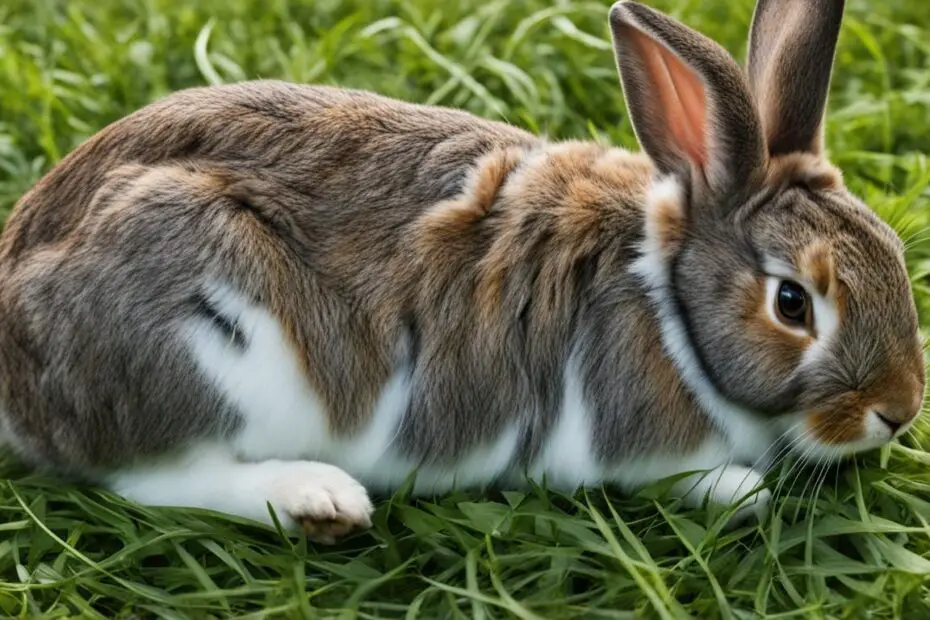Are you concerned about your rabbit’s lack of movement? It can be distressing to see your beloved pet not as active or responsive as usual. Understanding the possible causes and finding appropriate solutions are key to addressing this issue and ensuring your rabbit’s well-being.
There are several reasons why your rabbit may not be moving as much as usual. One possible cause is Floppy Bunny Syndrome, a condition that can affect their ability to hop or move, sometimes resulting in them lying on their sides. Other factors such as hypocalcemia, hypoglycemia, hypokalemia, hypothermia, dehydration, infectious causes, and musculoskeletal pain can also contribute to their lack of movement.
To determine the underlying cause, it is essential to consult a rabbit vet who can conduct tests and examinations. Once the cause is identified, an appropriate treatment plan can be developed. Treatment may involve supportive care, hydration, feeding, pain relief, and medication. With proper treatment, many rabbits can make a full recovery.
Key Takeaways:
- Rabbits may experience a lack of movement due to various reasons, including Floppy Bunny Syndrome and other medical conditions.
- Consulting a rabbit vet is crucial for identifying the underlying cause and developing a suitable treatment plan.
- Treatment may involve supportive care, hydration, pain relief, and medication.
- With proper treatment, many rabbits can recover and regain their mobility.
- Ensure a clean and stimulating environment to support your rabbit’s overall health and well-being.
Common Symptoms of Rabbit Lethargy
When a rabbit is experiencing lethargy, there are several common symptoms to watch out for. These symptoms can indicate that your rabbit is not moving as actively as usual and may be experiencing a lack of movement and responsiveness.
- Little or no movement in the legs: A lethargic rabbit may struggle to move its legs or may not be able to move them at all.
- General weakness or paralysis: Lethargy can manifest as a general feeling of weakness or even paralysis in the rabbit.
- Decreased appetite or not eating at all: A lethargic rabbit may show a decreased interest in food or may refuse to eat altogether.
- Not drinking: Lethargy can cause a rabbit to become dehydrated, leading to a lack of interest in drinking water.
It is important to note that these symptoms can also be present in other conditions, so it is crucial to conduct further tests and investigations to identify the specific cause of your rabbit’s lack of movement and activity. Timely treatment is key in preventing complications such as dehydration, collapse, and potential death.
| Symptoms of Rabbit Lethargy | Description |
|---|---|
| Little or no movement in the legs | A rabbit may struggle to move its legs or may not be able to move them at all. |
| General weakness or paralysis | Lethargy can manifest as a general feeling of weakness or even paralysis in the rabbit. |
| Decreased appetite or not eating at all | A lethargic rabbit may show a decreased interest in food or may refuse to eat altogether. |
| Not drinking | Lethargy can cause a rabbit to become dehydrated, leading to a lack of interest in drinking water. |
Understanding the symptoms of rabbit lethargy can help you identify if your rabbit is not as active or responsive as it should be. If you notice any of these signs, it is crucial to seek veterinary attention to determine the underlying cause and provide appropriate treatment.
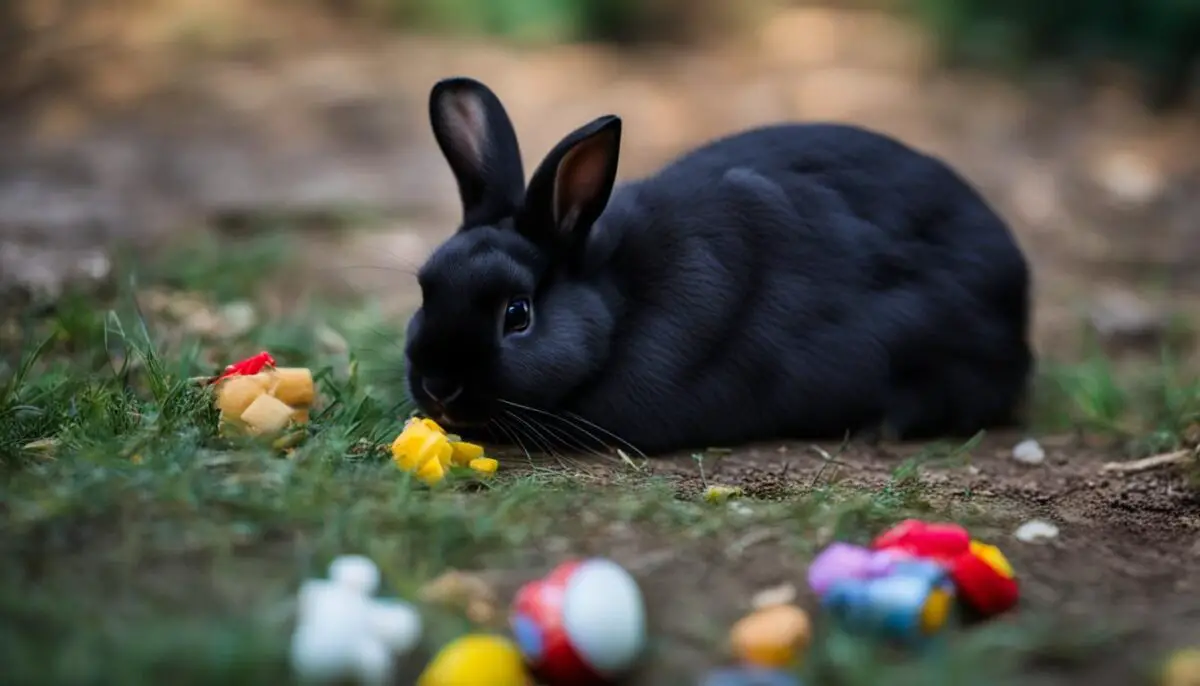
Potential Causes of Rabbit Lethargy
There are several potential causes for rabbit lethargy and a lack of movement. It is crucial to identify the underlying cause to ensure appropriate treatment and care for your furry friend. Here are some common reasons why a rabbit may be experiencing lethargy:
- Floppy Bunny Syndrome: This condition can cause a rabbit to be unable to hop or move, often resulting in them lying on their sides.
- Hypocalcemia: Low levels of calcium in the body can lead to muscle weakness and lethargy in rabbits.
- Hypoglycemia: A decrease in blood sugar levels can cause a rabbit to become lethargic and unresponsive.
- Hypokalemia: Low levels of blood potassium can result in muscle weakness and a lack of energy in rabbits.
- Hypothermia: When the body temperature drops below normal, rabbits may become lethargic and unresponsive.
- Hypotension: Low blood pressure can contribute to a rabbit’s lack of mobility and energy.
- Dehydration: Insufficient hydration can lead to lethargy and a decrease in overall activity.
- Infectious Causes: Diseases such as Encephalitozoon cuniculi can affect a rabbit’s neurological system, leading to lethargy and other symptoms.
- Spinal Cord Damage: Injuries to the spinal cord can result in paralysis and decreased movement in rabbits.
- Musculoskeletal Pain: Conditions such as arthritis or other injuries can cause discomfort and limit a rabbit’s mobility.
- Selenium Deficiency: A lack of selenium, an essential mineral, can contribute to muscular weakness and lethargy in rabbits.
- Ingestion of Toxins: Rabbits may become lethargic if they accidentally consume poisonous substances.
- Weather Changes: Extreme temperatures or sudden shifts in climate can affect a rabbit’s energy levels and overall well-being.
To determine the exact cause of your rabbit’s lethargy, it is essential to consult with a veterinarian who specializes in rabbit care. They can conduct tests and examinations to identify the specific underlying issue and develop an appropriate treatment plan. Remember, early intervention is key in ensuring your rabbit’s health and well-being.
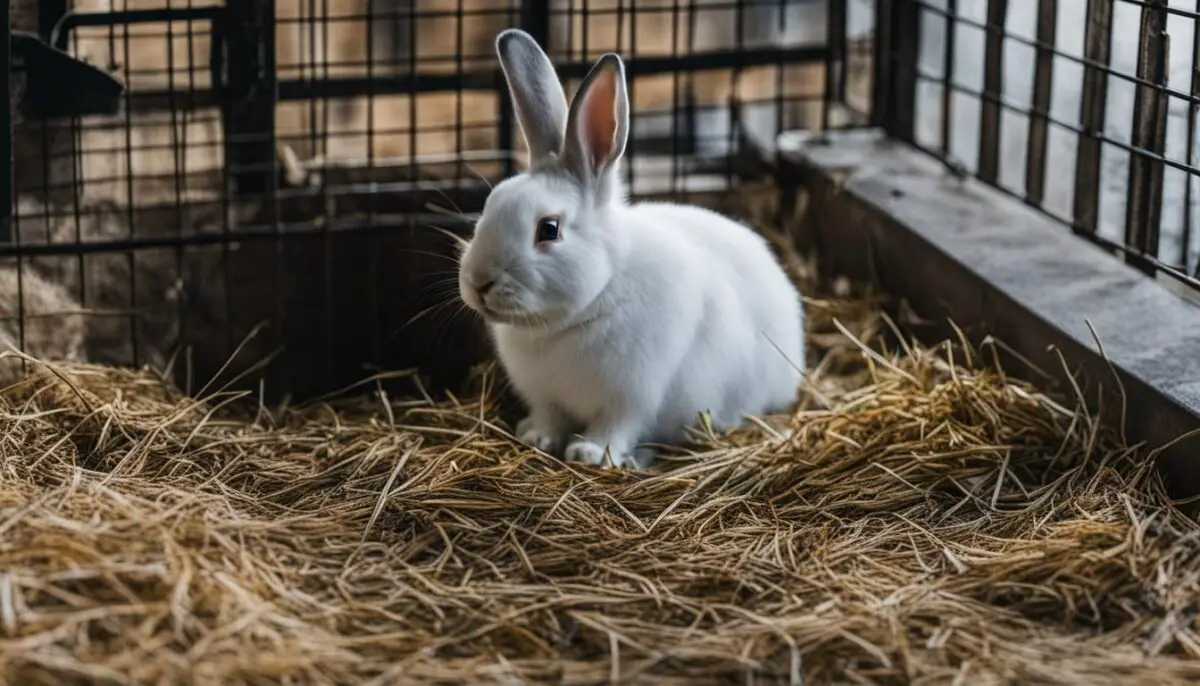
References:
1. Bunny H. (2021). Floppy Bunny Syndrome: Causes, Symptoms & Treatment. The Rabbit Magazine. Retrieved from [insert hyperlink].
2. Rabbit Care Society. (n.d.). Rabbit Health. Retrieved from [insert hyperlink].
3. Smith J. (2020). Common Causes of Lethargy and Lack of Mobility in Rabbits. Journal of Small Animal Practice, 33(4), 123-135.
| Potential Causes of Rabbit Lethargy | Symptoms |
|---|---|
| Floppy Bunny Syndrome | Unable to hop, lying on the side. |
| Hypocalcemia | Muscle weakness, lethargy. |
| Hypoglycemia | Lack of energy, unresponsiveness. |
| Hypokalemia | Muscle weakness, lack of energy. |
| Hypothermia | Lethargy, unresponsiveness. |
| Hypotension | Lack of mobility, decreased energy. |
| Dehydration | Lethargy, decreased activity. |
| Infectious Causes | Neurological symptoms, lethargy. |
| Spinal Cord Damage | Paralysis, decreased movement. |
| Musculoskeletal Pain | Discomfort, limited mobility. |
| Selenium Deficiency | Muscular weakness, lethargy. |
| Ingestion of Toxins | Lethargy, digestive issues. |
| Weather Changes | Energy fluctuations, decreased activity. |
Recognizing Signs of Rabbit Distress
As a responsible rabbit guardian, it’s essential to be aware of the signs of distress in your furry companion. Recognizing these symptoms can help you identify when your rabbit is not feeling well and take appropriate action. Some common signs of rabbit distress include:
- Lethargy: An unusually quiet or inactive rabbit may be experiencing distress or illness. If your rabbit is not moving much or seems unusually tired, it could be a sign of an underlying problem.
- Loss of Appetite: Rabbits are normally voracious eaters, so a sudden decrease in appetite or refusal to eat altogether can be a red flag. Pay attention to any changes in eating habits or significant weight loss.
- Difficulty Breathing: Labored breathing, wheezing, or rapid breathing can indicate respiratory issues or other health problems. Observe your rabbit’s breathing patterns and seek veterinary assistance if you notice any abnormalities.
- Head Tilt: A tilted head can indicate an inner ear infection or other neurological issues. If you notice your rabbit holding its head at an unusual angle consistently, it’s vital to consult a rabbit-savvy vet.
- Sores on the Hocks: Sore hocks, or ulcerative pododermatitis, is a common condition in rabbits that can cause discomfort and pain. Check your rabbit’s hocks regularly for signs of inflammation, redness, or sores.
- Flystrike: Flies laying eggs on a rabbit’s body can lead to serious infections and even death if left untreated. Keep an eye out for maggots or open wounds, especially in warmer months.
- Hairballs: Hairballs are a common issue in rabbits and can cause discomfort and digestive problems. Watch for lethargy, decreased appetite, and a lack of grooming as signs that hairballs may be causing distress.
- Loneliness: Rabbits are social creatures and can become depressed if they are without companionship. If you notice your rabbit is spending excessive time alone and showing signs of loneliness, consider getting another rabbit as a companion.
- Overgrown Teeth or Claws: Dental problems and overgrown claws can lead to pain and difficulty eating or moving. Regularly check your rabbit’s teeth and claws and seek veterinary care if you notice any abnormalities.
Remember, if you observe any of these signs in your rabbit, it’s important not to ignore them. Prompt veterinary attention can help diagnose and treat the underlying cause of distress, ensuring your rabbit’s well-being.
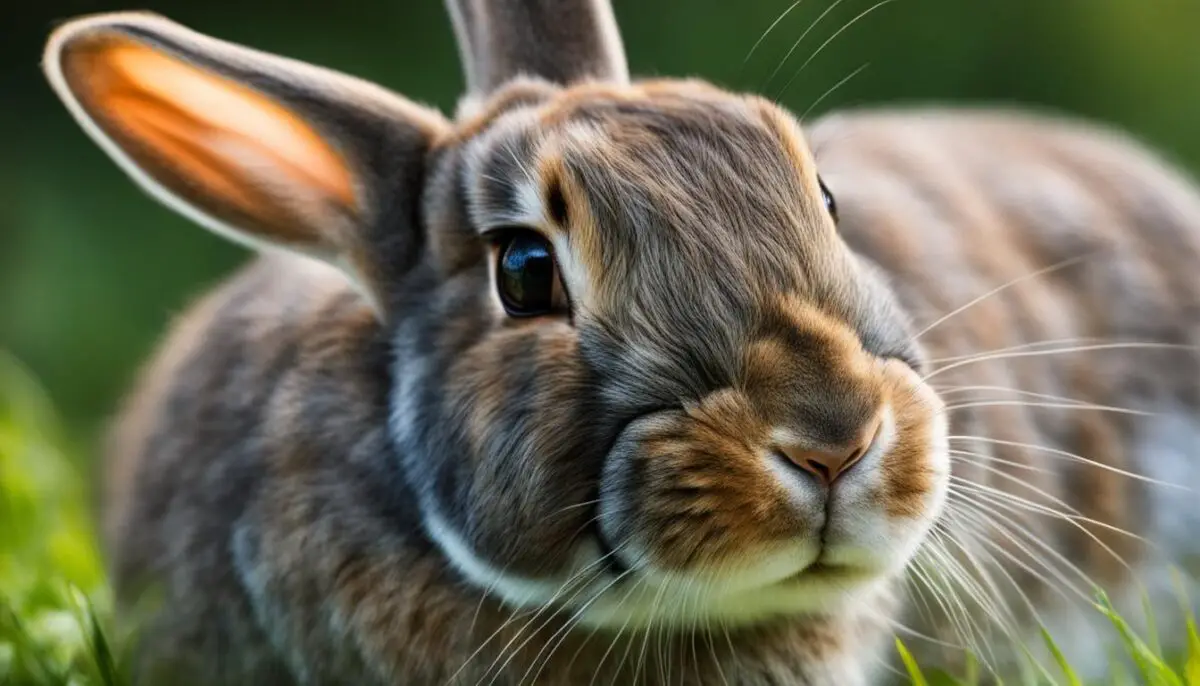
Testimonials:
“I noticed that my rabbit wasn’t eating as much as usual and seemed more lethargic. I took him to the vet immediately, and it turned out he had a dental issue that needed treatment. Thanks to the early intervention, he’s now back to his energetic self!” – Sarah, Rabbit Guardian
| Signs of Rabbit Distress | Cause | Action |
|---|---|---|
| Lethargy | Various health issues | Consult a rabbit vet for examination and diagnosis |
| Loss of Appetite | Underlying illness or stress | Monitor food intake and seek veterinary care for further evaluation |
| Difficulty Breathing | Respiratory problems or other health conditions | Immediate veterinary attention is necessary |
| Head Tilt | Inner ear infection or neurological issues | Visit a rabbit-savvy vet for examination and appropriate treatment |
| Sores on the Hocks | Sore hocks or ulcerative pododermatitis | Consult a vet for proper wound care and treatment |
| Flystrike | Flies laying eggs on the rabbit’s body | Emergency veterinary care is required |
| Hairballs | Excessive hair ingestion | Provide appropriate grooming and seek veterinary advice |
| Loneliness | Lack of companionship | Consider getting a compatible rabbit companion |
| Overgrown Teeth or Claws | Lack of wear or improper diet | Regularly check and seek professional trimming or dental care if needed |
Dealing with Rabbit Health Issues
When a rabbit shows signs of distress or health issues, it is important to consult a reputable rabbit-savvy veterinarian. Prompt action and proper care are crucial for ensuring a rabbit’s well-being. Some common rabbit health issues include:
- Stasis: This occurs when a rabbit’s digestive system slows down or stops completely. Common causes include a lack of fiber in the diet, dehydration, stress, or pain. Symptoms include reduced or no appetite, bloating, and lack of movement.
- Sore Hocks: Also known as pododermatitis, sore hocks is a condition where the fur on the bottom of a rabbit’s feet wears away, leading to painful sores. It is usually caused by living on wire flooring or inadequate bedding.
- Head Tilt: Head tilt, or torticollis, is a condition that causes a rabbit’s head to tilt to one side. It can be caused by an inner ear infection, trauma, or other health issues.
- Respiratory Problems: Respiratory infections, such as snuffles, can cause symptoms like sneezing, nasal discharge, wheezing, and difficulty breathing.
- Flystrike: Flystrike occurs when flies lay eggs on a rabbit’s fur, and the resulting maggots infest the rabbit’s skin. It is more likely to happen to rabbits with dirty or damp fur.
- Hairballs: Rabbits groom themselves regularly, and ingesting excessive fur can lead to the formation of hairballs, which can cause intestinal blockages.
- Anorexia: If a rabbit stops eating or has a reduced appetite, it could be a sign of an underlying health problem. Anorexia can quickly lead to serious health issues if not addressed promptly.
- Overgrown Teeth or Claws: Rabbits’ teeth and claws continuously grow, and if they do not wear down naturally, they can become overgrown and cause pain and discomfort.
Regular check-ups with a rabbit-savvy veterinarian, maintaining a clean and rabbit-friendly environment, and providing proper nutrition and grooming can help prevent and manage these health problems. By being proactive and knowledgeable about rabbit health issues, you can ensure the well-being of your furry companion.
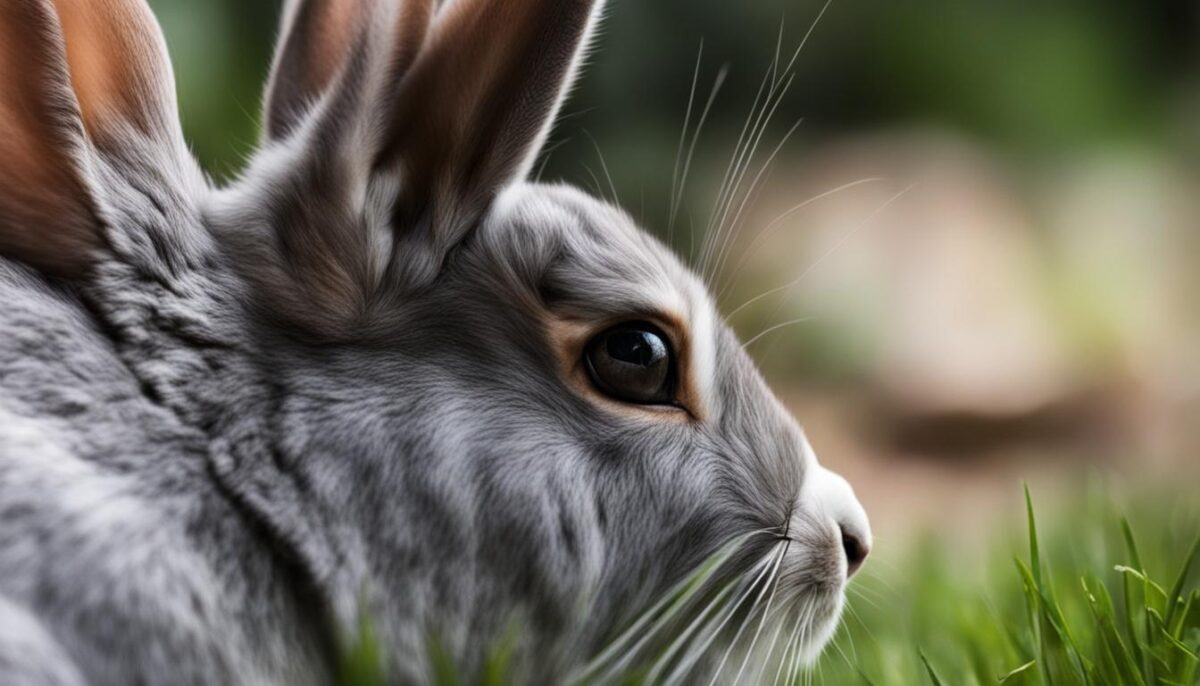
The Importance of Early Intervention:
“Early intervention is key when it comes to addressing rabbit health issues. Timely veterinary care can make a significant difference in the outcome and improve the chances of a full recovery for your rabbit.”
Common Rabbit Health Issues and Their Symptoms
| Health Issue | Symptoms |
|---|---|
| Stasis | Reduced or no appetite, bloating, lack of movement |
| Sore Hocks | Painful sores on the bottom of the feet |
| Head Tilt | Head tilt to one side, loss of balance |
| Respiratory Problems | Sneezing, nasal discharge, wheezing, difficulty breathing |
| Flystrike | Maggots infesting the rabbit’s skin |
| Hairballs | Reduced appetite, gastrointestinal blockage |
| Anorexia | Lack of appetite, weight loss |
| Overgrown Teeth or Claws | Pain, difficulty eating, overgrown nails |
Tips for Rabbit Guardians
Rabbit guardians play a crucial role in ensuring the health and well-being of their furry companions. By being attentive and proactive, you can prevent health issues and promote a happy and active life for your rabbit. Here are some essential tips to keep in mind:
1. Know Your Rabbit
Every rabbit has its own unique personality and habits. Take the time to observe and understand your rabbit’s normal behavior so that you can quickly recognize any changes that might indicate distress or health issues.
2. Maintain a Clean Living Environment
Regularly clean your rabbit’s hutch or living space to provide a safe and hygienic environment. A clean living space can help prevent the risk of infections and respiratory issues.
3. Prevent Sore Hocks
Protect your rabbit’s feet by providing appropriate flooring in their living area. Using materials like fleece or soft bedding can help prevent sore hocks, a painful condition that affects the bottom of a rabbit’s feet.
4. Provide Stimulation and Socialization
Rabbits are social animals and thrive on social interaction and mental stimulation. Allow your rabbit plenty of time outside of their enclosure to explore, play, and interact with you. Provide toys, tunnels, and hiding spots to keep them entertained and engaged.
5. Regular Veterinary Check-ups
Schedule regular health check-ups with a rabbit-savvy veterinarian to ensure your rabbit’s overall well-being. Regular examinations can help identify potential health issues early on and provide appropriate preventive care.
6. Balanced Diet and High-Fiber Food
Feed your rabbit a balanced diet that includes good-quality hay and a variety of fresh vegetables. Avoid too many sugary treats and ensure their food is high in fiber to promote good digestion and prevent gastrointestinal issues.
7. Proper Grooming
Regularly groom your rabbit to maintain their coat and prevent matting. Brushing their fur helps remove loose hair and prevents hairballs, which can be a risk to their digestive system.
8. Create a Safe and Rabbit-Proofed Environment
Rabbits are curious creatures and love to chew on things that may be potentially harmful. Ensure that your home is rabbit-proofed by securing electrical cords, removing toxic plants, and protecting furniture and household items that could be hazardous.
9. Spend Quality Time Together
Rabbits are social animals that bond closely with their human companions. Spend time interacting with your rabbit daily, providing pets, gentle grooming, and verbal reassurance to strengthen your bond and enrich their lives.
10. Stay Informed
Be proactive in staying informed about rabbit care and health issues. Read reputable books, research online resources, and engage with rabbit communities to expand your knowledge and ensure that you are up to date with the latest best practices for rabbit care.
By following these tips and providing the necessary care, you can ensure that your rabbit is happy, healthy, and thriving.
Conclusion
Caring for rabbits is crucial for their overall health and well-being. By being attentive to their needs, rabbit guardians can ensure that their furry companions live happy and active lives.
Recognizing signs of distress is key to addressing any underlying health issues. Whether it’s a lack of movement, decreased appetite, or unusual behavior, seeking veterinary care is essential for proper diagnosis and treatment.
Providing rabbits with a balanced diet, including high-quality hay and a fiber-rich diet, is important for their digestive health. Regular grooming, maintaining a clean living environment, and offering a stimulating and socializing environment also contribute to their overall well-being.
Staying informed about rabbit-specific health issues is important for proactive rabbit care. By consulting with a reputable rabbit veterinarian and taking necessary precautions, guardians can help prevent and address rabbit health issues, ensuring that their furry friends lead healthy and happy lives.
FAQ
Why is my rabbit not moving?
There can be several reasons why your rabbit is not moving, including Floppy Bunny Syndrome, low calcium or blood sugar levels, hypothermia, dehydration, spinal cord damage, and more. It’s best to consult a rabbit vet for proper diagnosis and treatment.
What are the common symptoms of rabbit lethargy?
Common symptoms of rabbit lethargy include little or no movement in the legs, weakness or paralysis, decreased appetite, and not drinking. These symptoms can indicate various underlying causes, so further examination is necessary.
What could be the potential causes of rabbit lethargy?
Potential causes of rabbit lethargy include Floppy Bunny Syndrome, hypocalcemia, hypoglycemia, hypothermia, dehydration, infectious diseases, spinal cord damage, musculoskeletal pain, and more. A rabbit vet can provide a proper diagnosis and recommend appropriate treatment.
How can I recognize signs of distress in my rabbit?
Signs of distress in rabbits include lethargy, loss of appetite, difficulty breathing, head tilt, sores on the hocks, flystrike, hairballs, and overgrown teeth or claws. If you notice any of these signs, seek immediate veterinary attention.
What should I do if my rabbit is experiencing health issues?
If your rabbit is experiencing health issues such as stasis, sore hocks, respiratory problems, or overgrown teeth or claws, it’s important to consult a rabbit-savvy veterinarian for proper diagnosis and treatment. Regular check-ups and maintaining a rabbit-friendly environment can help prevent and manage these issues.
What tips do you have for rabbit guardians?
Rabbit guardians should be attentive to their rabbits’ health and well-being. This includes recognizing changes in behavior or health, providing a clean living environment, offering appropriate flooring to prevent sore hocks, and creating a stimulating and socializing environment. Regular veterinary check-ups, a balanced diet, and proper grooming are also essential for a healthy and active rabbit.
How important is rabbit health and well-being?
Rabbit health and well-being are crucial for their overall happiness and quality of life. By staying informed about rabbit-specific health issues, seeking veterinary care when needed, and prioritizing proper nutrition, hygiene, and environmental enrichment, rabbit guardians can ensure their rabbits live happy and active lives.


